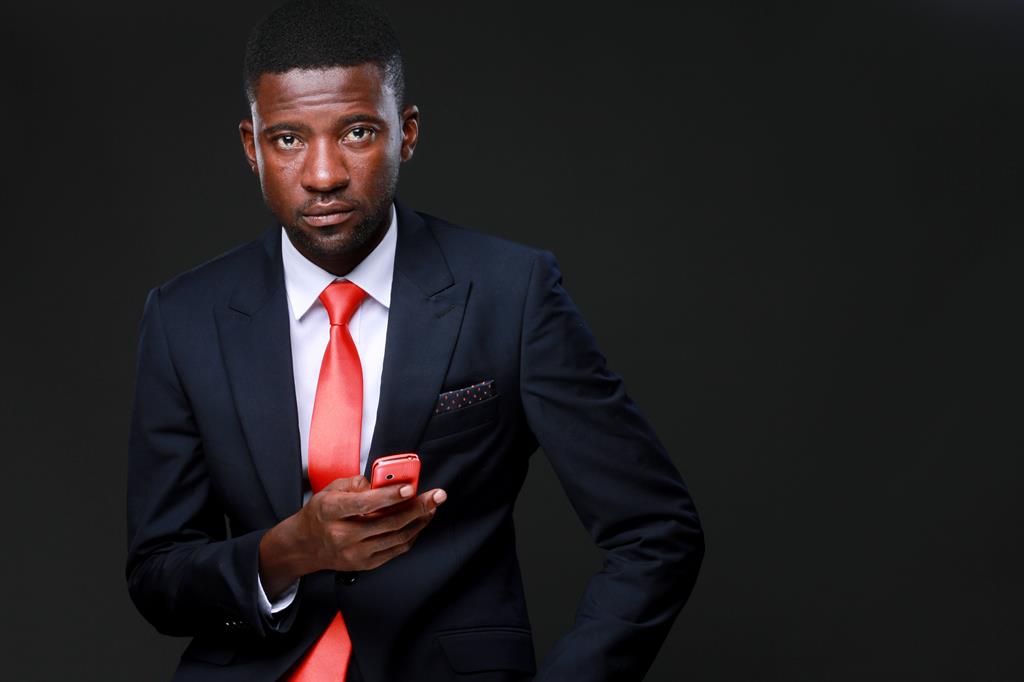The man behind the Katoshe D30 phone
Most young entrepreneurs face huge challenges and end up being demotivated and then quitting, but this is not the case with Kennedy Liswani.
Gabby Tjiroze - His future was unpredictable and hard to imagine, but today he is the mastermind behind Katoshe D30 - a mobile phone that features Namibia's indigenous languages. According to the 34-year-old, who owns Elephonic Mobiles, his dream of manufacturing a cellphone came when he bought an expensive device that he lost within a week.
“It all stated about three years ago when I purchased a very expensive smartphone that I lost within a week and replaced it with a cheaper android phone that cost me one quarter of the price I paid for the first phone.
“It struck me one night that it did not feel any different from the N$15 000 one that I literally flushed away. To add insult to injury, I discovered that it only costs this specific western brand N$2 500 to manufacture.
“So one night as I was seated in my office I decided to do a bit of research on how to start a mobile phone company. Initially I wanted to start with a smartphone for the African market, but I later changed my mind and started with a feature phone after researching on how smartphones are losing market share to feature phones in Africa,” said an enthusiastic Kenny.
The mobile features five languages namely Oshikwanyama, Otjiherero, Afrikaans, Rukavango and Silozi.
The phone functions like any other with a phonebook, messaging, a call history, and surprisingly enough, even WhatsApp.
Other features include a one-megapixel camera, a wireless radio and an expandable memory of up to eight gigabytes. The battery's standby time is up to 15 days.
“These devices are cheap, reliable and appealing for new and old users. We make sure our devices are designed for our local people. They have multiple SIM card slots and camera software adapted to better snap darker skin tones, and speakers with enhanced bass for wireless radio, considering the fact that radio is still a big thing in Africa. Our feature phone models also have internet and messaging apps,” added Kenny.
His entrepreneurial journey started in 2004 when he quit tertiary education to pursue his dream, but things didn't go according to plan and he had to look for a job.
He started a graphic design studio in mid-2004 and ran it until 2006, when he saw business was very slow and he couldn't make ends meet.
He later joined First National Bank as teller and started studying banking part-time while also doing business.
Challenges
Most youngsters in Namibia are faced with numerous challenges in their quest to pursue entrepreneurship as an option for meaningful employment and to earn a decent income.
In 2012, his entrepreneurial drive once again knocked at his door and this time there was no turning back. He invested his time and dedication into his business. This is when he came up with Elephonic Mobiles.
Kennedy is no stranger to challenges, which is the norm for entrepreneurs but it didn't stop him from achieving his dream.
“My biggest challenge, like any other new entrepreneurial venture, was raising funds to make this dream a reality. Another big issue was the regulatory aspect of the process, whereby we had to acquire approval that required us to get our devices tested by an internationally accredited laboratory on various aspects, and especially the safety of the phones for human use.
“It took quite some time but eventually the 300-page CE report was issued and that is when we knew that we were good to go.
“Another challenge was getting credible translators for local languages, but eventually that was sorted out,” Kennedy said.
Communications Regulatory Authority of Namibia CEO, Festus Mbandeka, said that Kennedy submitted Type Approval application forms to the Authority for the “Katoshe D30” and a Type Approval Certificate was granted on 22 March 2018.
“As per the Regulations in respect of Type Approval and Technical Standards for Telecommunications Equipment, his applications are being duly considered” said Mbandeka.
Kennedy was born from Namibian parents in exile in Angola during the liberation struggle, and started school in Oshakati. He moved to Windhoek in the early 90s and started high school at Ella du Plessis, then moved to South Africa in the late 90s where he finished his matric.
He then went to varsity, studying communications and graphic design at the Tshwane University of Technology.
He advises young upcoming entrepreneurs to take risks.
“The fear of failure is the number one reason why most entrepreneurs never get started. If you want to start up a business and you really believe in your idea, get rid of all your safety nets, even if it means you need to quit your job, loose your salary and downgrade your comfortable lifestyle. Just do it!
“Another important piece of advice is read as many books as possible, I can never overemphasise the importance of reading and learning for entrepreneurs - be it from audio books, traditional books and newspapers,” Kennedy added.
The phones are currently only available through pre-sale orders at www.elephonicmobile.com.
They will be available in store countrywide from June 2018 and the retail price for a Katoshe D30 is only N$350.





Comments
My Zone
No comments have been left on this article